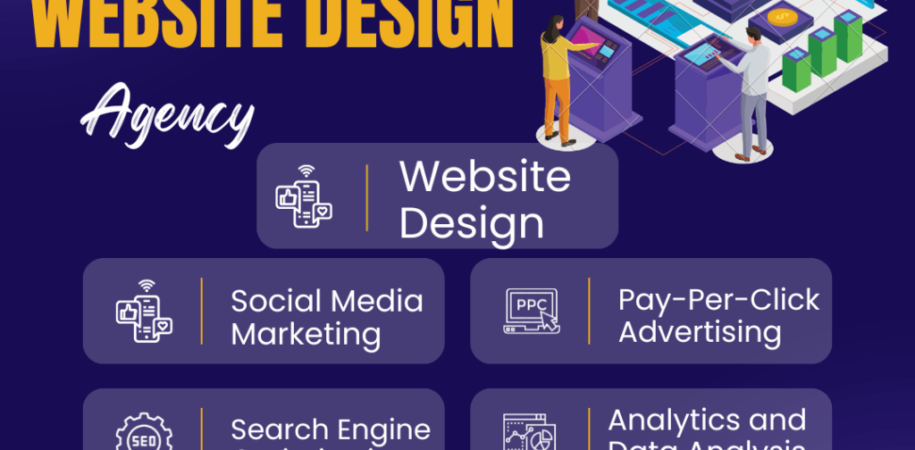In today’s digital age, having a website is no longer just an option—it’s a necessity for businesses of all sizes. Whether you run a small, local shop or a large, international corporation, a well-designed website can be the key to unlocking new opportunities, building customer trust, and driving growth. The internet is the first place consumers go when searching for products, services, or information. If your business isn’t online, it’s missing out on an incredible opportunity to engage with customers, showcase your offerings, and establish a solid brand presence.
In this blog post, we will explore the significant advantages that having a website provides for both small and large businesses. From building credibility to increasing sales, here’s why every business should have an online presence.
1. 24/7 Availability
One of the most significant advantages of having a website is that it makes your business available to customers 24/7. While brick-and-mortar stores have opening and closing hours, a website is always open. Potential customers can visit your site, browse your products or services, read your blog, and even make purchases whenever it’s convenient for them—whether it’s 2 PM or 2 AM. This kind of accessibility is especially valuable for both small and large businesses that want to capture customers who may not be able to engage during traditional business hours.
For small businesses, this ensures that you don’t miss out on any sales opportunities. For larger businesses, maintaining a constant online presence keeps customers informed and engaged, even outside of normal operating hours.

2. Cost-Effective Marketing
Traditional marketing methods like print advertisements, billboards, and television commercials can be very expensive. On the other hand, a website allows for far more cost-effective digital marketing strategies, such as Search Engine Optimization (SEO), pay-per-click ads, and social media marketing.
For small businesses with tight budgets, a website serves as a low-cost marketing platform that can reach more people than traditional methods. You can optimize your site with SEO techniques so that it appears in search engine results when potential customers search for your products or services. A small investment in SEO can yield significant returns by driving organic traffic to your site.
For large businesses, websites enhance marketing campaigns by providing a central hub for customer engagement, enabling advanced analytics, tracking, and A/B testing to measure the success of various strategies.
3. Enhanced Credibility
In today’s market, customers expect a business to have an online presence. A professionally designed website conveys credibility, legitimacy, and trustworthiness. Small businesses especially benefit from this as it levels the playing field, allowing them to compete with larger businesses by establishing a solid online reputation.
For big businesses, a website reinforces brand strength and maintains customer trust. A well-maintained website, complete with customer testimonials, case studies, or press mentions, reinforces your reputation and allows you to differentiate yourself from competitors.
4. Expanding Customer Base
A physical location restricts a business to a specific geographic area, but a website eliminates these boundaries. By being online, small businesses can extend their reach to national or even international markets. This is especially useful for niche businesses with unique offerings that may appeal to customers outside their local area.
For large businesses, a website facilitates global expansion without the need for establishing physical stores in every location. Through online marketing and SEO strategies, businesses can capture international audiences and expand their customer base significantly.
5. Improved Customer Service
A website serves as a valuable tool for improving customer service. Through FAQs, chatbots, contact forms, or support pages, businesses can provide instant answers to customer questions or guide them toward finding solutions. This reduces the need for staff to handle every customer inquiry, which is particularly beneficial for small businesses with limited resources.
Large businesses, on the other hand, can automate their customer service processes more efficiently with a website. Features like self-service portals, online chat support, and comprehensive product guides make it easier to serve a higher volume of customers, improving overall satisfaction.
6. Showcasing Products and Services
For both small and large businesses, a website is a perfect place to showcase your products and services in detail. Whether you sell physical goods or offer services, having a dedicated space to highlight what you offer with photos, descriptions, and customer reviews can significantly influence purchasing decisions.
Small businesses can use their website to highlight their unique products or personalized services, making it easy for potential customers to understand what sets them apart from the competition. Big businesses with a broad range of products can feature entire catalogs on their websites, offering detailed product specifications and even demonstration videos, further enhancing the customer experience.
7. Direct Sales Opportunities
E-commerce functionality can transform your website into a powerful sales channel. This is particularly important for small businesses that may not have the resources to open multiple physical stores. By offering products online, small businesses can drive sales without the limitations of geography. Integrating payment gateways, such as Razorpay or PayPal, allows businesses to accept payments online easily.
Larger businesses can capitalize on the global reach of e-commerce to boost revenue. Offering an online store not only enhances customer convenience but also provides an additional sales stream, further diversifying income channels.
8. Better Customer Engagement and Relationship Building
A website allows businesses to build and maintain customer relationships through content. Blog posts, newsletters, and social media integration make it easy to keep customers informed and engaged. Small businesses can create personalized, relatable content that appeals to their target audience, helping to foster loyalty and encourage repeat business.
For large businesses, a website serves as a platform to showcase expertise and authority within their industry. Thought leadership content, press releases, and detailed case studies build credibility, while interactive features like polls, surveys, and feedback forms encourage customer participation and keep the conversation going.

9. Data Collection and Insights
One of the most valuable aspects of having a website is the ability to gather data about your visitors. Tools like Google Analytics provide insights into how users interact with your site, including which pages they visit, how long they stay, and what actions they take. This information is invaluable for both small and large businesses, allowing them to make informed decisions about marketing, product offerings, and customer engagement.
For small businesses, these insights can help tailor content to better suit the needs of their audience. For larger businesses, advanced analytics can help optimize the customer journey, identify pain points, and increase conversions.
10. Competitive Advantage
A website can give small businesses a competitive advantage over rivals who don’t have an online presence or have a poorly designed site. With a professional website, small businesses can present themselves on the same level as larger competitors, allowing them to capture customers they may not have otherwise reached.
For large businesses, a well-designed website keeps them ahead of the curve in a competitive market. Continuous updates, new content, and customer interaction keep a large business relevant and attractive to both new and existing customers.
11. Online Advertising and Lead Generation
A website also serves as a platform for generating leads through online advertising campaigns. Whether it’s through Google Ads, social media marketing, or email marketing, a website acts as a landing page for potential customers to learn more about your offerings.
For small businesses, this kind of targeted advertising allows them to grow their audience and customer base without the massive expense of traditional advertising methods. Big businesses can take advantage of these tools by running sophisticated, large-scale campaigns to generate high-quality leads and drive significant traffic to their sites.
12. Building a Mailing List
A mailing list is a powerful tool for both small and large businesses to maintain communication with their audience. Through opt-in forms on your website, you can capture the email addresses of visitors interested in your products or services. Once you have a list, you can send out newsletters, promotional offers, and important updates to keep customers engaged and informed.
Small businesses benefit from mailing lists as a way to nurture potential leads over time, while large businesses can segment their lists and send highly targeted, personalized emails to different customer groups.
13. SEO and Local Search Optimization
For small businesses, being visible in local search results can make a significant difference. By optimizing your website for local SEO, you increase the likelihood that nearby customers will find your business when searching for products or services in their area. This is particularly important for businesses that rely on local customers.
Large businesses, meanwhile, benefit from more advanced SEO techniques, optimizing their site for national or even global search results. By consistently ranking high in search engine results, large businesses can dominate the market and outpace competitors.
14. Mobile Accessibility
With the increasing use of smartphones, a website that is mobile-friendly is crucial for both small and large businesses. A mobile-responsive site ensures that visitors have a seamless browsing experience, regardless of the device they’re using. Given that more than half of all internet traffic now comes from mobile devices, this is a must for any business looking to succeed online.
For small businesses, mobile accessibility ensures they capture every potential customer, while large businesses can enhance the user experience by offering mobile apps and mobile-friendly features.
15. Scalability
A website can grow and evolve with your business. As a small business, you might start with a simple site that provides essential information about your products or services. Over time, you can add e-commerce capabilities, integrate booking systems, or create membership areas.
For larger businesses, scalability is equally important. You might need to update your site to handle more traffic, expand to different languages, or integrate new technologies like AI and machine learning to provide a more personalized customer experience.



